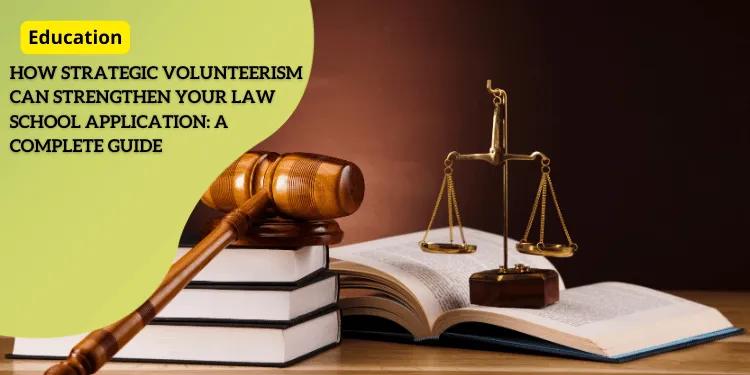How Strategic Volunteerism Can Strengthen Your Law School Application: A Complete Guide

Anúncios
How Unpaid Service Activities Demonstrate Character and Values to Law Schools
Unpaid service activities, whether conducted on campus or beyond, provide a window into an applicant’s character and values.
Law schools are keen on identifying candidates who will contribute positively to their communities and the legal profession.
Anúncios
Your choice of volunteer work reveals your commitment to various causes, your willingness to help others, and your capacity for empathy—all vital qualities for a future lawyer.
Volunteering demonstrates that you’re not just focused on personal gain but are also dedicated to making a meaningful difference.
Anúncios
Range of Volunteer Opportunities Available for Both Students and Working Professionals
The variety of volunteer opportunities is vast, catering to the diverse interests and schedules of both students and working professionals.
Typical activities can range from local community service like helping at food banks or animal shelters to global efforts such as working in orphanages or participating in disaster relief.
College students might engage in campus-based activities like organizing charity events or tutoring, while working professionals may lean towards roles in legal nonprofits or community boards.
The flexibility of volunteerism ensures there’s something for everyone, no matter where you are in life.
Key Attributes Law Schools Look for in Volunteer Experiences
Law schools particularly value certain qualities in volunteer experiences:
- Leadership and Initiative – Taking on leadership roles or starting new projects showcases your ability to take charge and positively influence others.
- Taking Responsibility – Engaging in roles that demand accountability, such as providing tax assistance to underserved populations or helping in domestic violence shelters, displays your readiness to handle significant duties.
- Advocacy – Demonstrating a commitment to causes you believe in, while respecting differing viewpoints, highlights your ability to engage constructively in advocacy.
- Building Community – Consistent involvement in your community, be it through neighborhood associations, interest groups, or religious congregations, indicates your reliability and teamwork skills.
- Legal Interest – Volunteering with law firms, legal nonprofits, or government offices underscores your dedication to the legal profession and your eagerness to acquire relevant experience.
Recognizing and showcasing these attributes through your volunteer work can set you apart in the competitive landscape of law school applications.
As you organize your experiences and strategies, think about how each opportunity reflects these sought-after traits.
This subsequently lays a strong foundation for your leadership and initiative in volunteer roles.
Leadership and Initiative in Volunteer Roles
Volunteerism offers a vital lens through which law schools can gauge your leadership and initiative.
While substantial volunteer experiences are valuable, taking on leadership roles within those experiences can set your application apart.
Importance of Taking on Leadership Positions
Leadership is central to the legal profession; law schools are keen to see applicants who are proactive and unafraid to step up.
Leadership roles in volunteer activities can range from organizing community outreach events to leading a team in a nonprofit.
Such positions demonstrate your ability to manage, inspire, and guide others towards a common goal.
Leadership can also be shown through less formal avenues. For example, spearheading a fundraising campaign or coordinating a local clean-up drive.
These acts reveal initiative and a natural tendency to lead, qualities that are indispensable for a future attorney.
How to Demonstrate Self-Starter Qualities Through Volunteerism
Being a self-starter means identifying needs and taking action without being prompted.
This quality can be reflected in various ways through volunteer work.
If you notice a local nonprofit is struggling with administrative tasks, volunteering to organize their files or manage their social media can highlight your initiative.
Starting a new program, like a literacy drive or a legal advice clinic, further cements your status as a go-getter.
Highlighting Experiences That Show Ability to Work with and Lead Others
Effective leadership isn’t just about taking charge; it’s also about collaboration.
Your volunteer experiences should reflect your ability to work harmoniously with a team and guide them towards achieving shared objectives.
Highlighting instances where you’ve resolved conflicts, motivated peers, or managed projects from conception to completion can be compelling.
For example, managing a group of volunteers at a shelter or organizing a legal aid workshop requires both leadership and teamwork.
These experiences should be clearly communicated in your application and personal statement, showcasing how you’ve successfully navigated complex group dynamics and delivered results.
Volunteerism is a multifaceted asset to your law school application.
Emphasizing leadership and initiative through your volunteer roles not only showcases your readiness for legal studies but also your potential to contribute significantly to the field.
Demonstrating Responsibility Through Service
Examples of High-Responsibility Volunteer Positions
Taking on high-responsibility volunteer roles is a stellar way to highlight your capability to handle serious duties.
Positions like providing tax help to underserved communities, working in domestic violence shelters, or assisting individuals with special needs can demonstrate your readiness to take on significant challenges.
For instance, offering tax assistance not only requires technical proficiency but also demands strict attention to detail and confidentiality.
Volunteer roles at shelters often involve managing sensitive situations, offering emotional support, and maintaining a secure environment for those in crisis.
Assisting individuals with special needs may involve a variety of tasks from personal care to educational support, all requiring a high level of patience, responsibility, and empathy.
Such experiences are critical in depicting your dedication and ability to manage substantial responsibilities.
Communicating the Weight of Responsibilities in Applications
Effectively communicating the weight of these responsibilities in your law school application is essential.
When drafting your personal statement or resume, clearly outline the duties you performed and the impact of your work.
Specify the scope of your responsibilities: how many people you aided, any leadership roles you undertook, and the skills you employed.
For example, if you volunteered at a shelter, detail how you managed daily operations, coordinated with staff, and provided support to residents.
If you offered tax help, describe how you worked with diverse clients, ensured accuracy, and maintained confidentiality.
These details help admissions officers understand the depth and importance of your volunteer experiences.
Importance of Recommendation Letters in Validating Responsibility Level
A strong recommendation letter can significantly bolster your application by providing credible validation of your responsibilities and performance.
Supervisors or colleagues who observed your volunteer work can offer an external perspective on your reliability, work ethic, and the impact of your contributions.
Encourage your recommenders to highlight specific examples of your responsibilities and achievements.
If you volunteered at a shelter, a supervisor might mention how you managed critical situations or provided exceptional support.
A letter from a tax assistance program might focus on your attention to detail, confidentiality, and the successful outcomes for clients.
These endorsements provide tangible evidence that complements your application narrative, showcasing you as a dependable and capable candidate ready for the rigors of law school and the legal profession.
Advocacy and Taking Stands
Balance Between Showing Strong Convictions and Respectful Engagement
When it comes to demonstrating advocacy in your law school application, showing strong convictions is crucial.
However, it’s equally important to balance these with respectful engagement.
Advocacy requires standing up for what you believe in, whether it’s through volunteer work at a local community center or participating in a political campaign.
Law schools look for applicants who can present their beliefs confidently and respectfully listen to differing viewpoints.
This balance shows that you are mature and ready to handle the diverse perspectives you’ll encounter in law school and beyond.
Appropriate Ways to Showcase Activism and Political Involvement
Volunteering for political organizations or participating in activism can be a compelling way to show your commitment to social justice and change.
When highlighting these activities on your application, focus on the skills and knowledge you gained.
For example, if you organized a voter registration drive, discuss your role in planning, leadership, and the impact of your efforts.
- Highlight specific achievements, such as improving voter turnout or educating the community on critical issues.
- Ensure you mention any leadership roles you took and how you navigated challenges.
- Be meticulous in adhering to school rules and local laws, and clarify that you remained within legal boundaries.
Navigating Controversial Topics While Maintaining Professionalism
Controversial topics are often integral to advocacy work.
Whether you’re passionate about environmental policy or criminal justice reform, it’s essential to present these issues thoughtfully.
Mention your advocacy in a way that highlights your passion without alienating those who may disagree.
- Focus on the positive outcomes of your work and what you learned from the experience.
- When discussing controversial subjects, aim to show an understanding of different perspectives.
- Use respectful language and avoid inflammatory statements.
Successfully showcasing your advocacy and the stands you took can make your law school application shine.
Demonstrating commitment and the ability to engage appropriately with controversy shows you have the potential to become a thoughtful and effective lawyer.
Next, we will explore how consistent involvement in your community can further strengthen your application.
Building Community Connections
Consistent community involvement can be a significant asset to your law school application.
It doesn’t just show your dedication to service; it also highlights your ability to build and maintain relationships, a critical skill for any legal professional.
Being a committed member of your community speaks volumes about your reliability, compassion, and willingness to contribute to the well-being of others.
Value of Consistent Community Involvement
Admissions committees value applicants who have demonstrated consistent engagement in their communities.
They seek individuals who understand the importance of social responsibility and who take active roles in fostering community cohesion.
Participating regularly in local activities shows that you are dependable and capable of forming meaningful connections with those around you.
Moreover, it highlights your ability to balance multiple responsibilities while making a tangible impact.
Different Types of Community Engagement
There are various avenues through which you can engage with your community:
- Neighborhood Activities: Volunteering in local initiatives like neighborhood clean-ups, safety patrols, or community gardens demonstrates your commitment to improving your immediate environment.
- Religious Congregations: Involvement in religious organizations, whether it’s through teaching, organizing events, or providing support services, showcases your dedication to faith-based community building.
- Interest Groups: Joining or leading interest-based groups, such as book clubs, sports teams, or hobbyist organizations, can show your ability to bring like-minded individuals together and create supportive networks.
Each type of engagement offers unique opportunities to develop interpersonal skills and make lasting contributions, both of which are highly valued by law schools.
Presenting Informal Community Contributions Effectively
Informal contributions to your community can be just as meaningful as formal volunteer positions.
Here’s how to present these experiences effectively on your application:
- Detail Your Role: Clearly describe what you did, your responsibilities, and the frequency of your involvement.
- Highlight Impact: Focus on the outcomes of your efforts. Explain how your contributions made a difference, whether it was organizing a community event, mentoring younger members, or volunteering at a local shelter.
- Link to Skills: Connect these experiences to skills relevant to law school, such as leadership, communication, problem-solving, and empathy.
By providing a comprehensive picture of your community involvement, you can demonstrate your readiness to contribute positively to a law school’s environment and, ultimately, to the legal profession.
Balancing volunteerism with other responsibilities is crucial, but consistent community engagement shows law schools that applicants like you can manage your time thoughtfully and make a difference, even with limited hours to spare.
Legal-Focused Volunteer Work
Volunteer work in a legal context can significantly reinforce your law school application.
It shows not only interest but also an active commitment to a legal career.
There are numerous opportunities to get involved, whether in law firms, nonprofits, or government offices.
By leveraging your technical skills and language abilities, you can make a notable impact in these settings.
Opportunities in Legal Settings
Working with a law firm, legal nonprofit, or a government office offers unique experiences that can set you apart.
These organizations often need help with tasks such as answering phones, organizing information, or even assisting with research.
For instance, volunteering in a legal aid clinic can include conducting client interviews, preparing legal documents, and offering general administrative support.
Law schools appreciate applicants who proactively seek out these opportunities.
Such roles demonstrate your willingness to engage with legal work beyond the classroom, highlighting your dedication and resolve.
Demonstrating Career Commitment
Engaging in legal volunteer work shows law schools you’re serious about a career in law.
It indicates that you have taken the initiative to immerse yourself in the legal environment, experiencing firsthand the challenges and responsibilities of the profession.
These experiences not only bolster your resume but also provide rich material for personal statements and interviews.
When discussing your volunteer work, focus on how it has prepared you for law school.
Describe specific tasks you managed and the skills you developed.
This not only exhibits your commitment but also shows a nuanced understanding of the profession.
Leveraging Technical Skills and Language Abilities
Your technical skills and language abilities can be a tremendous asset in legal volunteer work.
Fluency in a foreign language, for example, can be invaluable when working with diverse communities.
Similarly, technical skills such as familiarity with legal software or data management can make you indispensable in a busy office.
Be explicit in your applications about how these skills have been utilized.
Whether you helped translate documents for non-English speaking clients or organized case files using specialized software, these details underscore your ability to contribute meaningfully.
By strategically engaging in legal-focused volunteer work, you not only strengthen your law school application but also gain invaluable experience that will serve you well in your future legal career.
Managing Time Constraints and Alternative Paths
Balancing Volunteerism with Work and Family Responsibilities
Finding time for volunteer work while juggling professional and personal responsibilities can be challenging.
However, this can be turned into an advantage on your law school application.
Law schools understand the complexities of balancing various commitments and value the evidence of effective time management.
To successfully balance volunteerism with other responsibilities, consider:
- Prioritizing Tasks: Focus on volunteer activities that align closely with your future legal career or personal interests.
- Flexible Schedules: Look for volunteer opportunities that offer flexible hours, such as weekend or evening shifts.
- Integrating Volunteering into Daily Life: Choose activities that can seamlessly fit into your daily routine, like mentoring at your child’s school or assisting at a local community center near your workplace.
Communicating the strategies you use to manage your time highlights your ability to handle the rigorous demands of law school.
Alternative Ways to Demonstrate Preparation for a Legal Career
While volunteer work is significant, there are alternative ways to show readiness for a legal career.
For those who find it difficult to volunteer due to time constraints, consider these alternatives:
- Part-Time Jobs in Legal Settings: Positions like paralegal assistants or clerks in law firms can provide valuable experience.
- Professional Development Courses: Enrolling in courses related to law or soft skills such as negotiation and public speaking can demonstrate commitment.
- Pro Bono Projects: If formal volunteering is not feasible, look for short-term pro bono projects that cater to your specific skills.
- Online Volunteering: Contributing to online legal aid platforms where you can assist with research or provide virtual support.
Making the Most of Limited Volunteer Time
However limited your volunteer time, maximizing its impact is crucial.
When opportunities for extended commitments are scarce, choose roles that allow for substantial contributions within shorter periods.
Here’s how:
- Select High-Impact Activities: Engage in activities with immediate and profound impact, like legal clinics or one-off community legal education events.
- Utilize Skills and Interests: Choose volunteer roles that leverage your unique skill set, ensuring your involvement is efficient and effective.
- Document and Reflect: Keep detailed records of your volunteer activities and reflect on the outcomes. This can help when writing personal statements or during interviews.
Efficient use of your limited time can demonstrate to law schools your dedication and capability to balance multiple tasks, an essential skill in a legal career.






